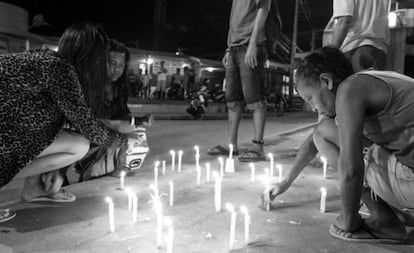Homicides in Brazil reach historic high
Newly released figures from 2012 show 42,416 deaths from incidents involving firearms


Homicides are on the rise in Brazil. According to the latest available data, from 2012, there were 42,416 deaths that year due to gunshot wounds – the worst statistic since 1980, when the Health Ministry began the data series for a so-called “Map of Violence.” Meanwhile, Brazil’s parliament has begun debating a proposal to loosen restrictions on the sale of firearms.
The report from the Map of Violence, which was presented on Thursday, offers more alarming information: there is an upward trend in gun-related deaths among black Brazilians.
The number of white individuals who died in incidents involving firearms fell by 23 percent between 2003 and 2012, while the number of blacks who died in the same way increased by 14.1 percent. Martin Sampaio, coordinator of the Human Rights Commission at Ordem dos Advogados do Brasil São Paulo (OABSP), says the report “refutes the myth of racial democracy in Brazil.”
The number of whites who died from gunshot wounds fell by 23 percent between 2003 and 2012 , while the number of black victims rose by 14.1 percent
This trend is a form of economic disparity. “In theory, the wealthier sectors have two levels of security at their disposal: public and private. Those who live on the outskirts of cities, mostly blacks, only rely on the government,” which normally offers fewer security measures, the report says.
“Brazil kills [its citizens] due to the lack of education and dignified housing here; because of the public health system, which is a veritable killing factory; and the lack of security,” says Débora da Silva, a founder of Mães de Maio, a group of mothers whose children have been victims of police brutality.
The figures have been released at a time when a group of congressmen from a number of political parties, backed by gun lobbies, have announced that they want to present an initiative to loosen restrictions on the sale of pistols and rifles in Brazil. This group has been baptized with the sinister nickname “the bullet camp.” The measure, which will be put to a vote within three or four months, will presumably pass, given that the balance of power in Congress has shifted to the right since the last elections.
The figures come at a time when congressmen, backed by gun lobbies, want to loosen restrictions on firearm sales
The group wants to repeal the so-called “Statute of Disarmament,” a law that came into force in 2003 under the administration of Luiz Inácio Lula da Silva. The measure made it more difficult to acquire firearms by raising the legal age to purchase a weapon from 21 to 25 years old, as well as tightening restrictions on the sale of ammunition, increasing the number of inspections and banning individuals from carrying weapons in public.
Despite the new law, gun-related deaths have been on the rise since 1980. But, experts say, that number would have been even higher had those restrictions not been put in place.
The report presented on Thursday highlights “the important preventive value of gun-control policies.” According to the statistical data, the law has helped save 170,000 lives.
Meanwhile, congressmen from the “bullet camp” are calling for the right to self-defense in the face of “increasing violence.” The group’s president, Marcos Montes (from the right-wing Social Democratic Party), who received campaign contributions from gun companies, says their proposal is viewed favorably by the public. Montes used a survey from 2005 to support his claim.
Tu suscripción se está usando en otro dispositivo
¿Quieres añadir otro usuario a tu suscripción?
Si continúas leyendo en este dispositivo, no se podrá leer en el otro.
FlechaTu suscripción se está usando en otro dispositivo y solo puedes acceder a EL PAÍS desde un dispositivo a la vez.
Si quieres compartir tu cuenta, cambia tu suscripción a la modalidad Premium, así podrás añadir otro usuario. Cada uno accederá con su propia cuenta de email, lo que os permitirá personalizar vuestra experiencia en EL PAÍS.
En el caso de no saber quién está usando tu cuenta, te recomendamos cambiar tu contraseña aquí.
Si decides continuar compartiendo tu cuenta, este mensaje se mostrará en tu dispositivo y en el de la otra persona que está usando tu cuenta de forma indefinida, afectando a tu experiencia de lectura. Puedes consultar aquí los términos y condiciones de la suscripción digital.








































